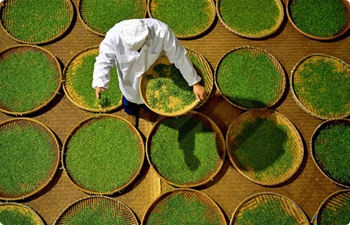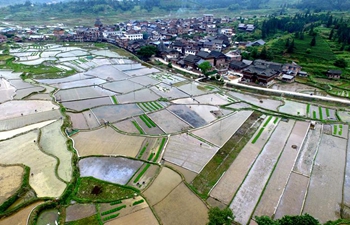
Ruqia Hakimi works at her spaghetti factory in Dihdadi district of Balkh province, Afghanistan, April 21, 2018. In militancy-plagued and patriarchal Afghanistan, women rarely dare to establish their own businesses and achieve economic self-sufficiency. Ruqia Hakimi, 41, however, has been brave enough to risk the misogynistic environment and established her own small spaghetti factory in Dihdadi district, 15 km west of Mazar-i-Sharif city, capital of northern Balkh province, to achieve her goal. (Xinhua/Rahmat Alizadah)
by Abdul Haleem, Jawed Omid
DIHDADI, Afghanistan, April 30 (Xinhua) -- In militancy-plagued and patriarchal Afghanistan, women rarely dare to establish their own businesses and achieve economic self-sufficiency.
Ruqia Hakimi, 41, however, has gone against the grain and has been brave enough to risk the misogynistic environment and has established her own small spaghetti factory in the Dihdadi district, 15 km west of Mazar-i-Sharif city, the capital of northern Balkh province, to achieve her goal.
"I established my factory four years ago. No doubt, it was difficult and risky at the beginning, but gradually we have overcome the challenges and today, 30 women are working with me in the factory to promote the business and supply our products to local markets," Hakimi told Xinhua.
Wearing a traditional dress and scarf, the gutsy business lady said that all her employees and staff are women from both nearby villages and far-flung areas, who work six days a week to increase the factory's outcome and their economic income.
Interestingly, all the employees of the enterprise are illiterate and uneducated women but are dedicated to their job.
"All of our workers working here are illiterate housewives," Hakimi went on to say, adding they are skilled and self-motivated employees, working with dedication to make a living for themselves and support the factory.
Aimed at providing job opportunities for women to achieve economic self-reliance and stand on their own feet, the ambitious Ruqia Hakimi said proudly that she would spare no efforts to increase her factory's products.
"I am determined to change this small spaghetti producing plant into a source of income for women living in the villages. This is an income-generating project and I am sure to achieve this goal in cooperation with women living nearby," Hakimi said confidently.
Nevertheless, she whimpered that her team is facing problems in marketing, admitting that cultural hurdles have limited the factory's marketing personnel to freely go out and find clients.
"We are facing problems, of course big problems in the marketing sector, because, all of our employees are women and they cannot travel alone from one place to another and from one province to another," complained the female entrepreneur, saying her products are merely sold in Balkh province, although she wants to export to other provinces.
In conservative Afghanistan, people especially in the countryside, deeply believe in old traditions, which bar women from working out of home or going out alone unless a close relative accompanies them.
Although, women's status in Afghanistan has noticeably improved over the past 16 years and the current environment has facilitated women to serve as ministers, legislators, businesspeople and lawyers, there's still long way ahead for Afghan women to achieve parity with men in the patriarchal society.
"I am satisfied with my income from working at this factory and this is the first time that I have worked outside my home," a mother of five, Sakina, 43, said happily.















